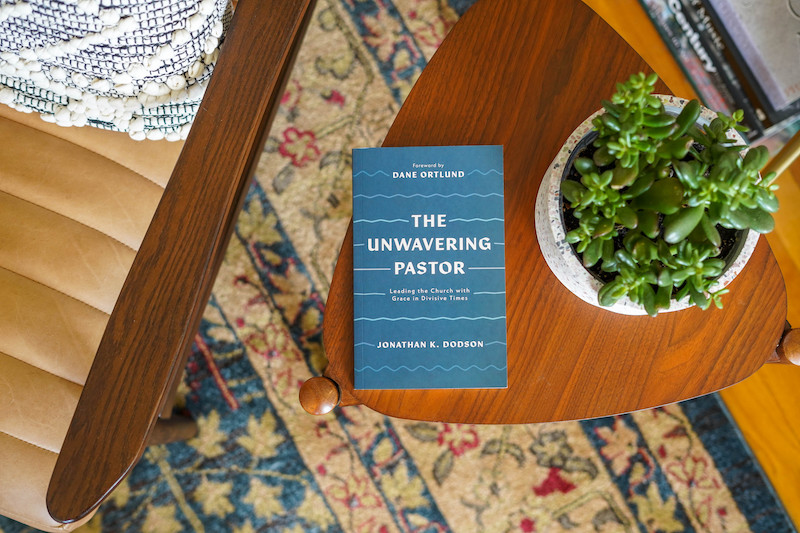“Preach the Word” (2 Timothy 4:2). Three words that summon up everything from aspirational zeal to serious self-doubt. Any given week, most of us plod from one extreme to the other. We labor over the Word, thrilled by exegetical insights and word studies, but when it comes to assembling our nuts and bolts into a full-blown working sermon, self-doubt creeps in. “Have I been true to the text?” “Does my application land in the hearts of my people?” “Have I anticipated cultural objections?” So, how do we faithfully preach the Word in chaotic times?
Hearing the Word
The answer to this question is not so much in preaching the Word but in letting the Word be preached to us. When we yield to the hammering effect of the Word that we experience in sermon preparation, we welcome weakness and inadequacy. But when we take up the hammer, and refuse to put it down, we remain on the outside of God’s Word. The movement from hammering to being hammered, from above the text to under the text, is one of prayer. To preach the Word is to preach Christ: not merely words about Christ but the person of Jesus himself. Click Para Twittear
In prayer, we respond to God’s Word and recognize it as his speech. We relate to him as a holy Speaker. His words solicit desperate pleas (“Help me, Lord!”), sincere repentance (“I have been controlling and self-centered this week, forgive me”), exuberant joy (“Glory to God!”) or blessed insufficiency. When I hit a homiletic impasse, I often push myself away from the desk and go for a walk: “Spirit, what am I missing? What do you want me to hear? What do our people need? Speak to me, Lord.” Our churches need not merely a well-prepared sermon but a well-worn preacher—a preacher who has been broken and cracked open so the golden words of God trickle in and transform them.
Preaching Christ
This confrontation between our inadequacy and God’s infinite sufficiency is a diorama of pastoral ministry. We are called to something we cannot accomplish. We announce transformative news while remaining powerless to transform anyone. This is a good problem. If we had the power to change others, we would inevitably neglect those who offend or hurt us. We would transform people unevenly, missing areas that only an omniscient God can see. We would, no doubt, alter things that do not need altering, like personalities that rub us the wrong way. We would wish change immediately instead of gradually, causing Christians to forgo arduous yet rewarding sanctification that stretches over a lifetime. We would not preach the Word. We would preach our insight, our stories, our knowledge, even our compassion—but not Christ.
But to preach the Word is to preach Christ: not merely words about Christ but the person of Jesus himself. We proclaim a Christ who came not as a disembodied set of ideas but as the Word made flesh. Missiologist Andrew Walls draws our attention to the specificity of the incarnation: “he became a person in a particular locality and in a particular ethnic group, at a particular place and time . . . he became a historically and culturally conditioned man” (235). Likewise, when we preach, we communicate the eternal, unchanging Word in a temporal, changing cultural form and idiom. When we preach, we communicate the eternal, unchanging Word in a temporal, changing cultural form and idiom. Click Para Twittear
Preaching the Word in Subversive Times
Paul’s famous imperative in 2 Timothy 4:2 is issued in the context of a conflict of authority, not the confines of a seminary classroom. It is situated between a divine charge and mythmaking. Some of Timothy’s congregants are settling for getting their ears tickled: a phrase that means to look for interesting and juicy bits of information. This disposition inclines them to privilege other teachers over local elders and to follow myths instead of Scripture.
In an information age, this disposition is ubiquitous. Objections to our preaching often come from a podcast or YouTube video consumed by our congregants. While outside teachers can enrich their hearers, ear-tickling information lures people away into elitist knowledge untethered to the Word of God. “Preach the Word” is an urgent exhortation in subversive times.
Paul issues the order to preach the Word from the divine court, the very “presence of God and of Christ Jesus” (v. 1), who together possess the authority to judge the world. Preaching the Word is a divinely authorized act from the One with authority over the living and the dead. Therefore, we should preach with a sense of heavenly accountability, discharging our responsibility with gravity.
Straddling Two Worlds
But preaching isn’t to be so heavenly minded that it is no earthly good. Preaching should not be done at a ninety-degree angle, shooting off into the theological atmosphere without touching down on earth. John Stott famously implores the preacher to proclaim God’s Word in 180 degrees. Begin in the biblical world, most certainly, but direct your preaching to the present world. Be acquainted with the real struggles of the people you lead and the cultural myths they are tempted to believe. Preaching the Word is a divinely authorized act from the One with authority over the living and the dead. Click Para Twittear
The minister of the Word stands between these two worlds. Straddling them is no easy task. For some, it is tempting to stay in the biblical world, throwing in an occasional application or cultural flourish. For others, cultural exegesis or life application is more alluring than mining the texts of Scripture. All are important, but there is no perfect blend in preaching. Instead, we should practice congregational listening to discern how best to engage with cultural myths.
Listening to Souls
Congregational listening is attending to your congregation. It is sitting down with souls and asking them what they struggle with, not generating imaginary application lists. We have to see their ears to preach to their hearts. A pastor who practices congregational listening pays attention to the issues that keep surfacing in the coffee shop or counseling office. They listen closely to the questions asked in small groups and discipleship relationships. They make a note of the objections frequently raised in theology and Bible classes. What patterns are you seeing in your people? What particular philosophies lead them astray? Listening to your congregation will enable you to discern which issues to address and how often to address them.
So, be relieved of striking a perfect balance between two worlds when preaching. Instead, listen to your church and the Spirit, and preach the Word.










